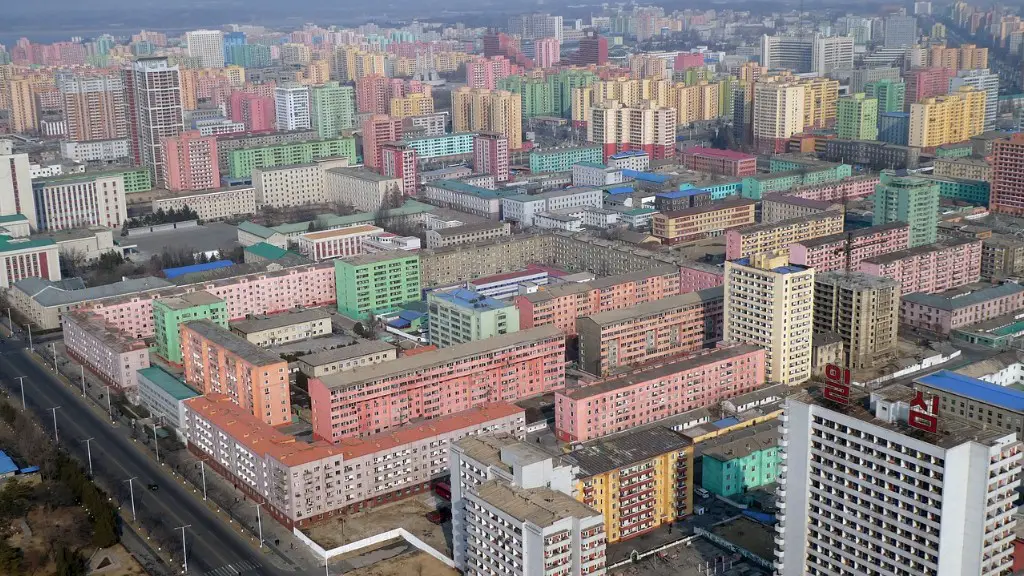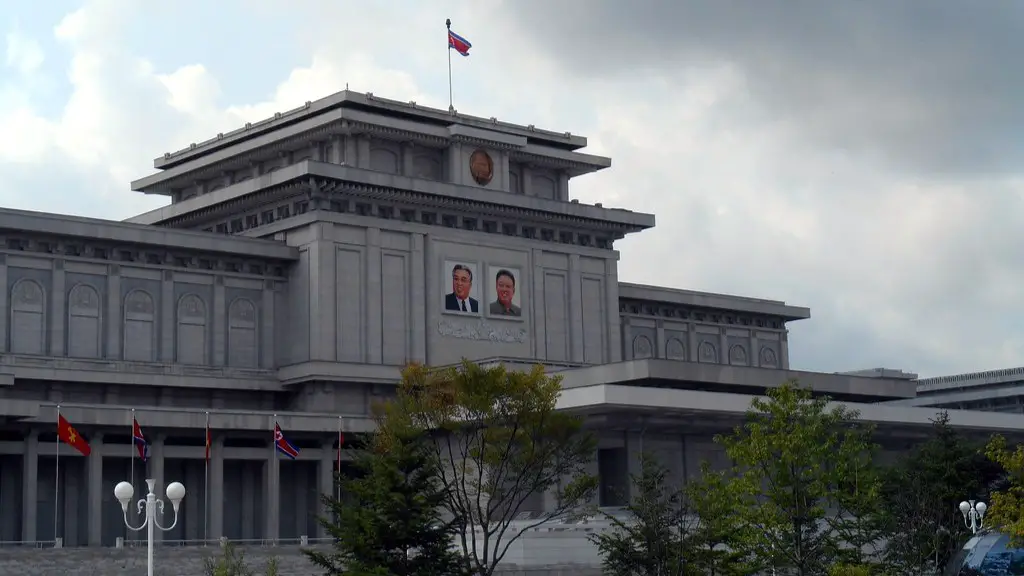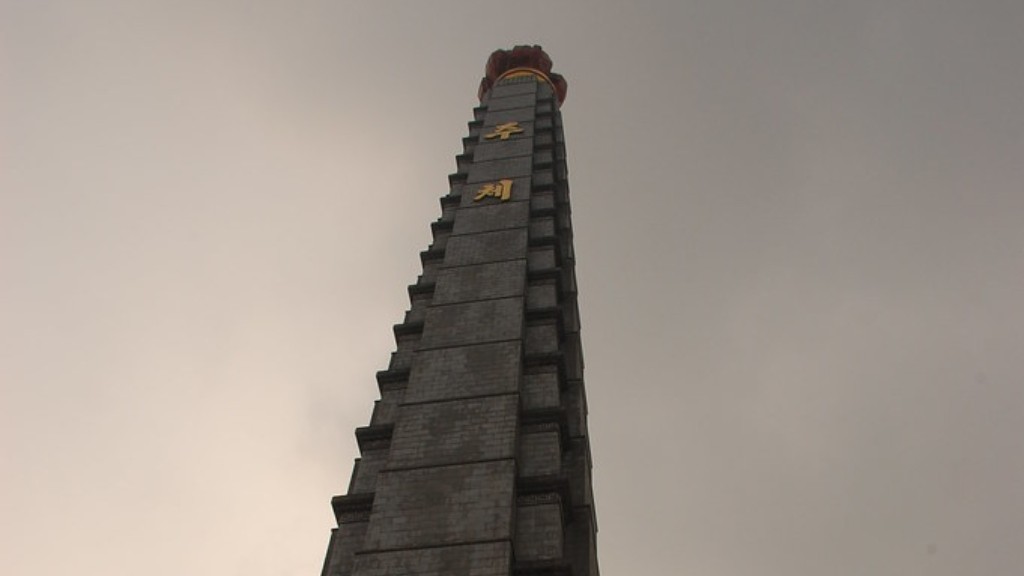North Korea is undoubtedly one of the most mysterious and isolated countries in the world. For over 7 decades, it has managed to remain in isolation, and many questions remain unanswered. What are the root causes of North Korea isolation? What is the true purpose of isolation?
Most agree that North Korea’s isolation began in 1948 with the establishment of the North Korean republic by Kim Il Sung, who was the first leader of North Korea. The Korean War, which lasted 3 years, saw North Korea at odds with the United States and its allies. After the war, North Korea declared themselves a self-reliant state, as opposed to a satellite state of Russia or China.
Furthermore, North Korea saw itself at odds with the rest of the world due to its pursuit of nuclear weapons and its aggressive approach to foreign policy. It has been speculated that the regime sought to isolate the country from the rest of the world in order to insulate itself from outside influences and to protect the government from interference from other countries. This explains why the country has such severe limits on the freedom of expression and freedom of movement for its citizens.
Over the years, North Korea’s policies of isolation have only grown more intense and comprehensive. North Korea has closed its border crossings and its airspace to all traffic. Foreigners are not normally allowed to enter the country, and North Koreans are discouraged from contacting people outside the country. The media is highly censored, and it is illegal to access foreign media. Additionally, anyone leaving the country must receive permission from the government.
In addition to the country’s isolation, North Korea has had to deal with crippling sanctions imposed by the United Nations and other countries around the world in response to the country’s nuclear development program and human rights abuses. These sanctions have had a major impact on the country, making it even more difficult for the regime to provide for its people.
International experts agree that the root cause of North Korea’s isolation is its government’s policy of “Juche” – which is a self-reliance ideology that puts the nation first, over any outside influences. This has led to an isolationist mentality, which has become more extreme over the years.
The consequences of North Korea’s isolation have been devastating for its citizens. While the regime is able to maintain its power, the vast majority of North Koreans suffer from poverty, hunger, and lack of access to basic services. Furthermore, the total isolation of the country from the outside world has led to a lack of information and knowledge.
Economic Impact
The economic impact of North Korea’s isolation on its citizens has been immense. International sanctions have severely inhibited economic growth, leaving the country’s economy in a state of disarray. The United Nations estimates that over 11 million North Koreans are in need of food assistance. Furthermore, the lack of international investment has stifled economic development and foreign investment.
The isolation of the North Korean economy has made it impossible for the nation to participate in the global economy and to benefit from the advantages that come with globalisation. This isolation has had a major impact on North Korea’s ability to develop and modernise its economy.
The North Korean government has tried several strategies to overcome the impacts of isolation, such as developing tourism and trading with other countries, but these efforts have been limited and unsuccessful.
It is clear that the effects of international isolation and economic sanctions have had a major impact on the lives of the people of North Korea.
Lack of Information
North Korea’s policy of isolation has also had a significant impact on its people by limiting access to information. North Koreans are not allowed to use the internet, watch foreign TV programs or read foreign newspapers. Consequently, the people are completely isolated from the outside world, which means they are unable to access information from outside sources.”
The government has also implemented strict censorship policies to prevent the spread of foreign ideas. All books, magazines, and newspapers are censored, and access to foreign websites is blocked.
Furthermore, the North Korean government strictly monitors all communication with foreign countries. Telephone conversations, emails and letters are censored before being sent out of the country. This lack of information has kept North Koreans unaware of the devastating conditions in their own country.
As a result, the North Korean people remain largely ignorant of the outside world, and the international community remains largely uninformed of the realities inside North Korea.
Failed Policies
North Korea’s policy of isolation has also had dire consequences for its citizens, as the government’s economic policies have failed to alleviate poverty and encourage economic growth.
The North Korean government has implemented several economic policies over the years, but due to lack of international investment and economic sanctions, these policies have had little effect on the nation’s economy.
Furthermore, the government has been reluctant to implement reforms that could lead to economic growth, such as liberalising the economy, reducing government controls and encouraging private enterprise. Instead, they have adopted a policy of “Military First”, which has left the nation with a weak economy and a population that is largely impoverished.
This dismal economic situation has led to an increase in illegal activities, such as smuggling and drug trafficking, which have further exacerbated the economic crisis in the country.
It is clear that North Korea’s isolationist policies have only served to worsen the already dire conditions in the nation.
Outside Influence
Due to the extreme isolation of North Korea, international attention has been limited in recent years. However, over the past decade, there have been some moves to improve diplomatic ties between North Korea and the rest of the world.
In 2018, the US and North Korea held a summit in Singapore which resulted in an agreement on denuclearisation. While this agreement did not prevent the US from maintaining sanctions against North Korea, it was seen as a positive step in the development of closer ties.
Furthermore, North Korea has also held diplomatic talks with other nations, such as China and Russia, in an attempt to reduce tensions between the two countries. North Korea has also opened up to foreign investments, which may help the nation to develop its economy in the future.
However, despite the signals of openness, the North Korean government has continued its policy of isolation, and it seems unlikely that the nation will open up anytime soon.
Impact on the World
The extreme isolation of North Korea has had an impact on the rest of the world. In the past, North Korea has been involved in several military conflicts, such as the Korean War, and its nuclear ambitions have caused global concern. Additionally, North Korea’s poor human rights record and its lack of access to information has been criticised by the international community.
Therefore, North Korea’s isolation has caused a great deal of tension in the world. As a result, the international community has resorted to sanctions and other punitive measures in an attempt to pressure North Korea into changing its policies.
However, the policy of isolation has been difficult to break. For over 7 decades, North Korea has managed to remain in isolation and its citizens have had to suffer in silence. It remains to be seen if North Korea will ever open up and allow its citizens to benefit from greater access to the outside world.
One thing is certain, as long as North Korea continues to remain isolated, the rest of the world will continue to be concerned about its intentions and its impact on global stability and security.





